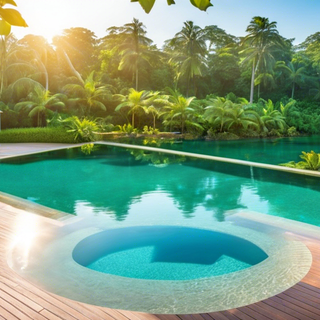Swimming pool maintenance is essential to keep your pool water crystal clear and inviting for a refreshing dip. By following these 10 tips, you can ensure that your pool remains clean, safe, and enjoyable for all swimmers.
Regular Skimming and Scrubbing
Skim the surface of your pool regularly to remove leaves, insects, and debris. Additionally, scrub the walls and tiles to prevent algae buildup and maintain a sparkling pool appearance.
Investing in a robotic pool cleaner can also help in keeping your pool clean with minimal effort.
Monitor Water Circulation
Proper water circulation is crucial for maintaining balanced chemicals and preventing stagnation. Check that your pump and filter are functioning effectively to keep the water flowing and prevent any issues.
Consider running your pool pump for at least 8-12 hours a day to ensure optimal circulation.
Maintain Optimal Chemical Levels
Regularly test and balance the pool water's pH, chlorine, and alkalinity levels to prevent bacteria growth and maintain water clarity. Use a pool testing kit to monitor these levels consistently.
You basically have two options to maintain the levels and avoid algae:
Option 1: Shock your pool on a weekly basis to eliminate contaminants and keep the water crystal clear.
Option 2: Use one of our Solar Pool Ionizers, which will kill any organic material before it can form into algae. The ionizer will also keep your pool from having to use so much chlorine. Average chlorine savings in a year is upwards of $750.00
Clean Filters and Check Equipment
Clean your pool filters regularly to ensure proper filtration and circulation. Additionally, inspect your pool equipment such as pumps, heaters, and lights for any signs of damage or malfunction.
Replace any worn-out parts promptly to avoid potential issues and maintain your pool's efficiency.
Proper Winterization
Before the winter season, properly winterize your pool to protect it from freezing temperatures and damage. Lower the water level, remove any detachable accessories, and add winterizing chemicals to keep the water clean during the off-season.
Covering your pool with a secure winter cover can also help in maintaining its condition during colder months.
Regular Pool Inspections
Conduct routine pool inspections to check for leaks, cracks, or any potential issues that may arise. Addressing these problems early can prevent costly repairs and ensure your pool stays in top condition.
Inspect the pool deck and surrounding area for any safety hazards or maintenance requirements.
Proper Pool Shocking
Shock your pool after heavy usage, heavy rain, or when the water appears cloudy. Pool shocking helps eliminate bacteria, algae, and other contaminants that regular chlorine levels may not address.
Follow manufacturer guidelines when shocking your pool and allow sufficient time for the chemicals to dissipate before swimming.
Regular Backwashing
Backwash your pool filter as recommended to remove built-up debris and contaminants. Proper backwashing helps maintain the filter's efficiency and ensures clean water circulation.
Monitor the pressure gauge on your filter and backwash when the pressure rises significantly.
Proper Pool Cover Usage
Use a pool cover when the pool is not in use to prevent debris accumulation, evaporation, and maintain water temperature. Choose a cover that fits securely and is suitable for your pool type.
Clean the pool cover regularly to prevent dirt and leaves from falling into the pool when removing it.
Professional Maintenance Checks
Consider scheduling regular professional pool maintenance checks to ensure your pool equipment is functioning correctly and the water quality meets standards. Professional services can help identify issues early and provide expert solutions.
Consult with pool maintenance experts for tailored advice on caring for your specific pool type and size.




